Ronald Carter Quotes & Sayings
Enjoy the top 29 famous quotes, sayings and quotations by Ronald Carter.
Famous Quotes By Ronald Carter
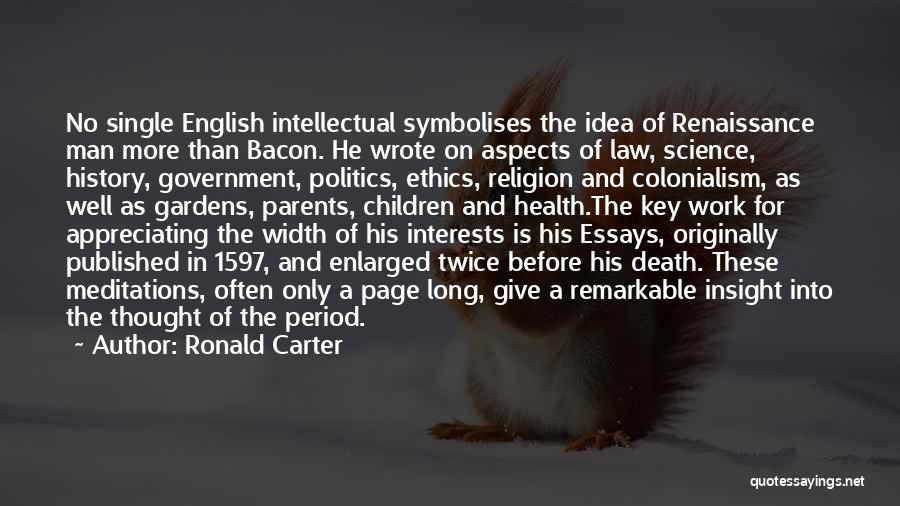
No single English intellectual symbolises the idea of Renaissance man more than Bacon. He wrote on aspects of law, science, history, government, politics, ethics, religion and colonialism, as well as gardens, parents, children and health.
The key work for appreciating the width of his interests is his Essays, originally published in 1597, and enlarged twice before his death. These meditations, often only a page long, give a remarkable insight into the thought of the period. — Ronald Carter
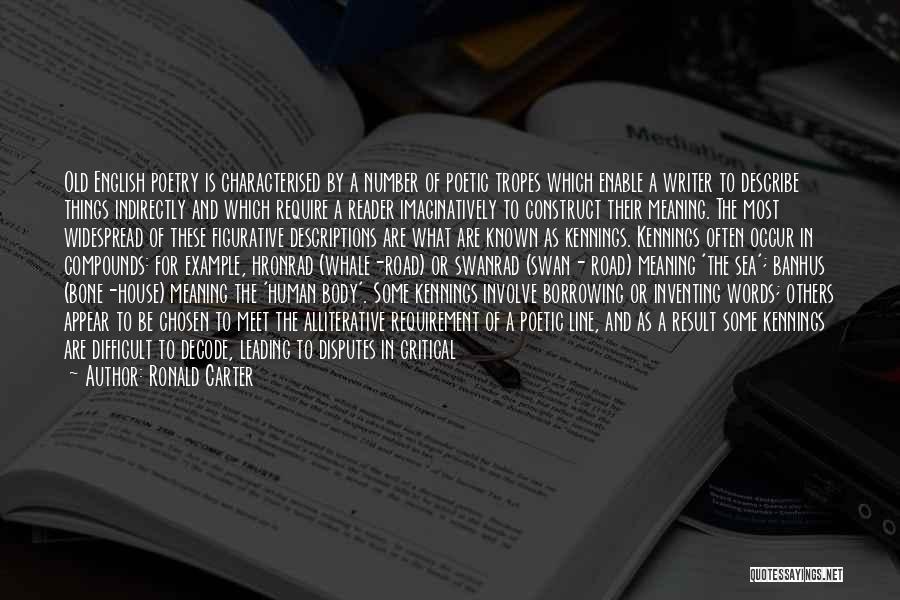
Old English poetry is characterised by a number of poetic tropes which enable a writer to describe things indirectly and which require a reader imaginatively to construct their meaning. The most widespread of these figurative descriptions are what are known as kennings. Kennings often occur in compounds: for example, hronrad (whale-road) or swanrad (swan- road) meaning 'the sea'; banhus (bone-house) meaning the 'human body'. Some kennings involve borrowing or inventing words; others appear to be chosen to meet the alliterative requirement of a poetic line, and as a result some kennings are difficult to decode, leading to disputes in critical interpretation. But kennings do allow more abstract concepts to be communicated by using more familiar words: for example, God is often described as moncynnes weard ('guardian of mankind'). — Ronald Carter
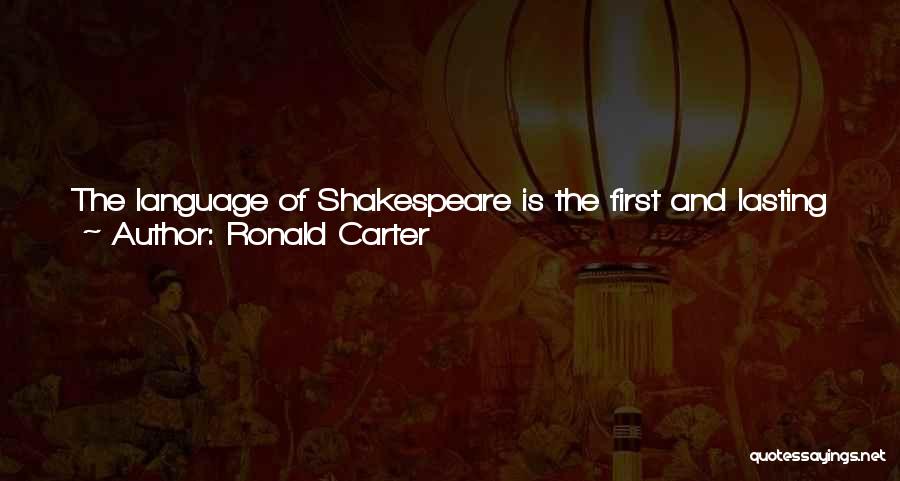
The language of Shakespeare is the first and lasting affirmation of the great changes that took place in the sixteenth century, leaving the Middle English of Chaucer far behind. In many ways, the language has changed less in the 400 years since Shakespeare wrote than it did in the 150 years before he wrote. — Ronald Carter
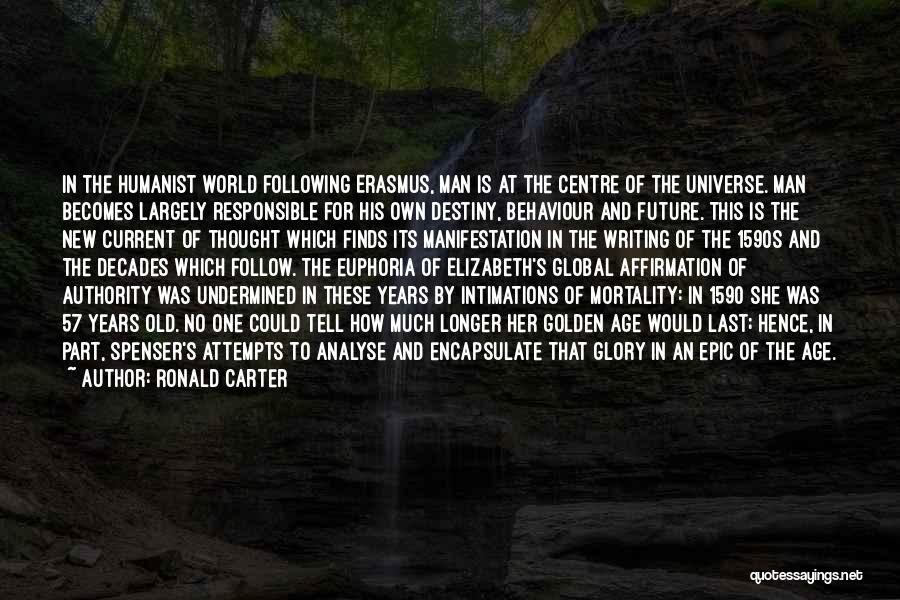
In the humanist world following Erasmus, man is at the centre of the universe. Man becomes largely responsible for his own destiny, behaviour and future. This is the new current of thought which finds its manifestation in the writing of the 1590s and the decades which follow. The euphoria of Elizabeth's global affirmation of authority was undermined in these years by intimations of mortality: in 1590 she was 57 years old. No one could tell how much longer her golden age would last; hence, in part, Spenser's attempts to analyse and encapsulate that glory in an epic of the age. This concern about the death of a monarch who - as Gloriana, the Virgin Queen - was both symbol and totem, underscores the deeper realisation that mortality is central to life. After the Reformation, the certainties of heaven and hell were less clear, more debatable, more uncertain. — Ronald Carter
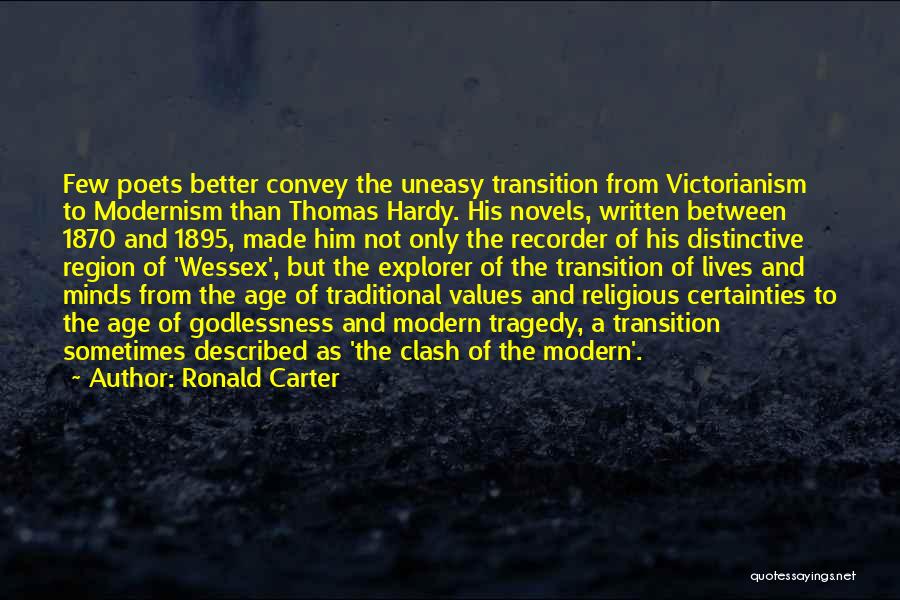
Few poets better convey the uneasy transition from Victorianism to Modernism than Thomas Hardy. His novels, written between 1870 and 1895, made him not only the recorder of his distinctive region of 'Wessex', but the explorer of the transition of lives and minds from the age of traditional values and religious certainties to the age of godlessness and modern tragedy, a transition sometimes described as 'the clash of the modern'. — Ronald Carter
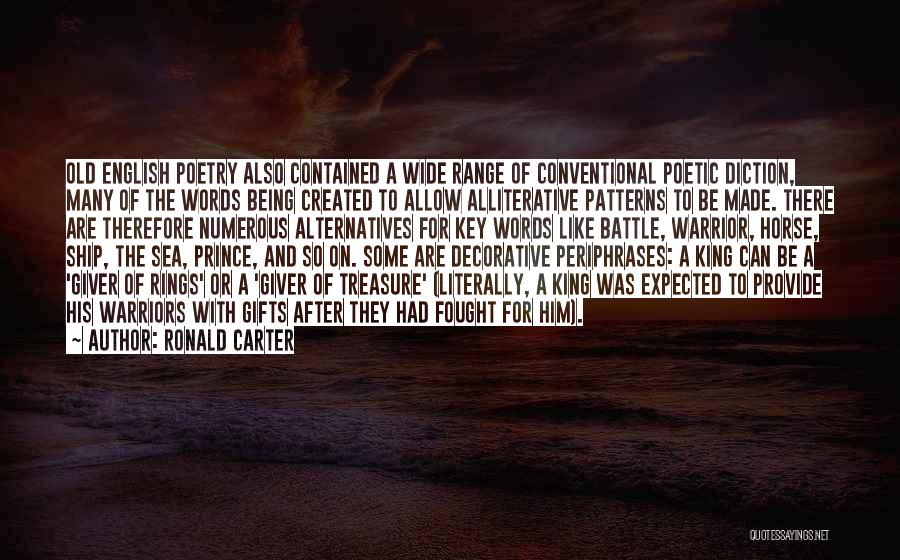
Old English poetry also contained a wide range of conventional poetic diction, many of the words being created to allow alliterative patterns to be made. There are therefore numerous alternatives for key words like battle, warrior, horse, ship, the sea, prince, and so on. Some are decorative periphrases: a king can be a 'giver of rings' or a 'giver of treasure' (literally, a king was expected to provide his warriors with gifts after they had fought for him). — Ronald Carter

The Renaissance did not break completely with mediaeval history and values. Sir Philip Sidney is often considered the model of the perfect Renaissance gentleman. He embodied the mediaeval virtues of the knight (the noble warrior), the lover (the man of passion), and the scholar (the man of learning). His death in 1586, after the Battle of Zutphen, sacrificing the last of his water supply to a wounded soldier, made him a hero. His great sonnet sequence Astrophel and Stella is one of the key texts of the time, distilling the author's virtues and beliefs into the first of the Renaissance love masterpieces. His other great work, Arcadia, is a prose romance interspersed with many poems and songs. — Ronald Carter
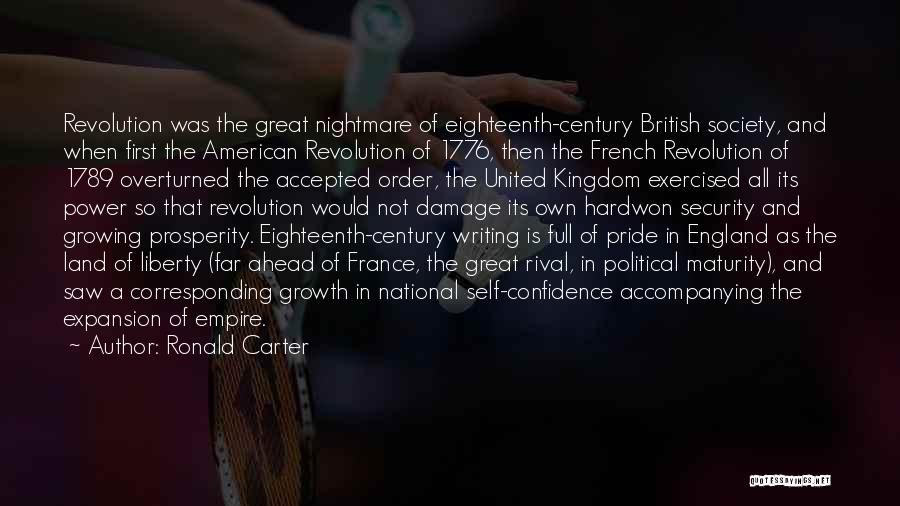
Revolution was the great nightmare of eighteenth-century British society, and when first the American Revolution of 1776, then the French Revolution of 1789 overturned the accepted order, the United Kingdom exercised all its power so that revolution would not damage its own hardwon security and growing prosperity. Eighteenth-century writing is full of pride in England as the land of liberty (far ahead of France, the great rival, in political maturity), and saw a corresponding growth in national self-confidence accompanying the expansion of empire. — Ronald Carter
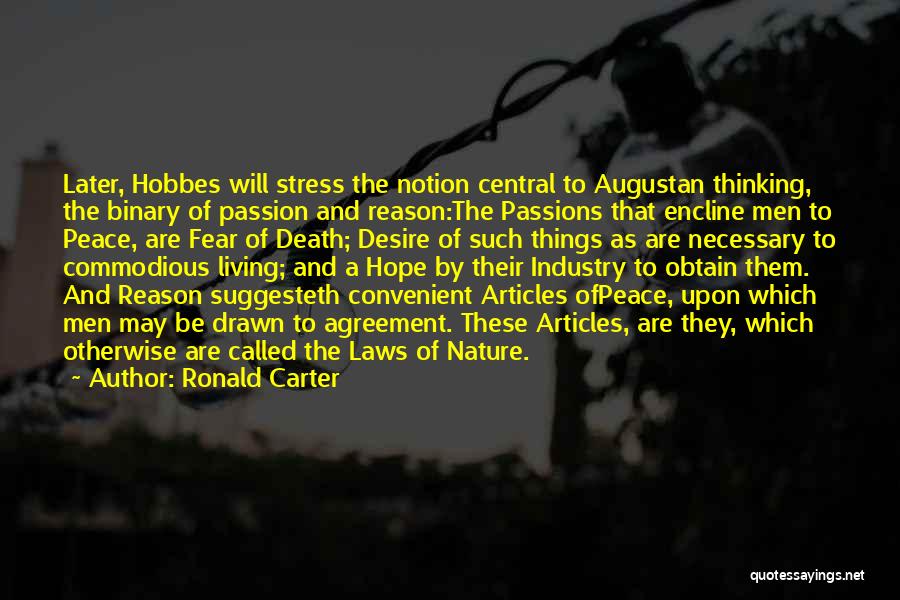
Later, Hobbes will stress the notion central to Augustan thinking, the binary of passion and reason:
The Passions that encline men to Peace, are Fear of Death; Desire of such things as are necessary to commodious living; and a Hope by their Industry to obtain them. And Reason suggesteth convenient Articles of
Peace, upon which men may be drawn to agreement. These Articles, are they, which otherwise are called the Laws of Nature. — Ronald Carter
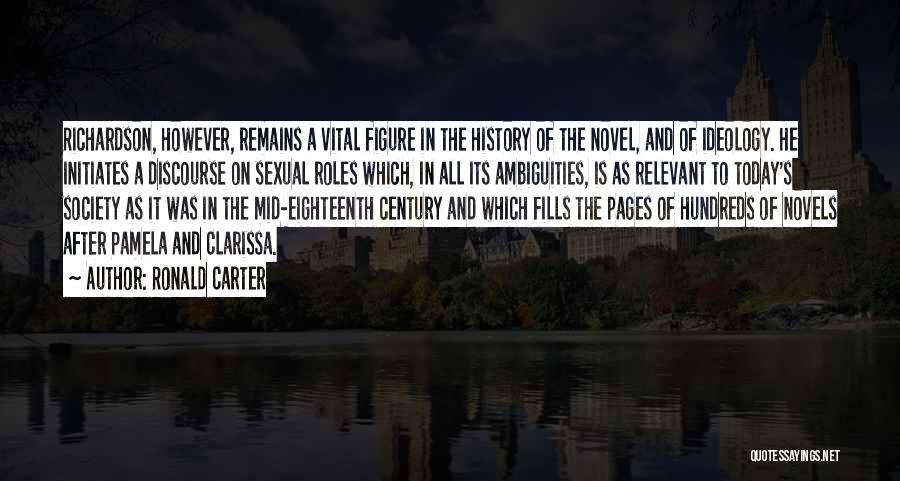
Richardson, however, remains a vital figure in the history of the novel, and of ideology. He initiates a discourse on sexual roles which, in all its ambiguities, is as relevant to today's society as it was in the mid-eighteenth century and which fills the pages of hundreds of novels after Pamela and Clarissa. — Ronald Carter
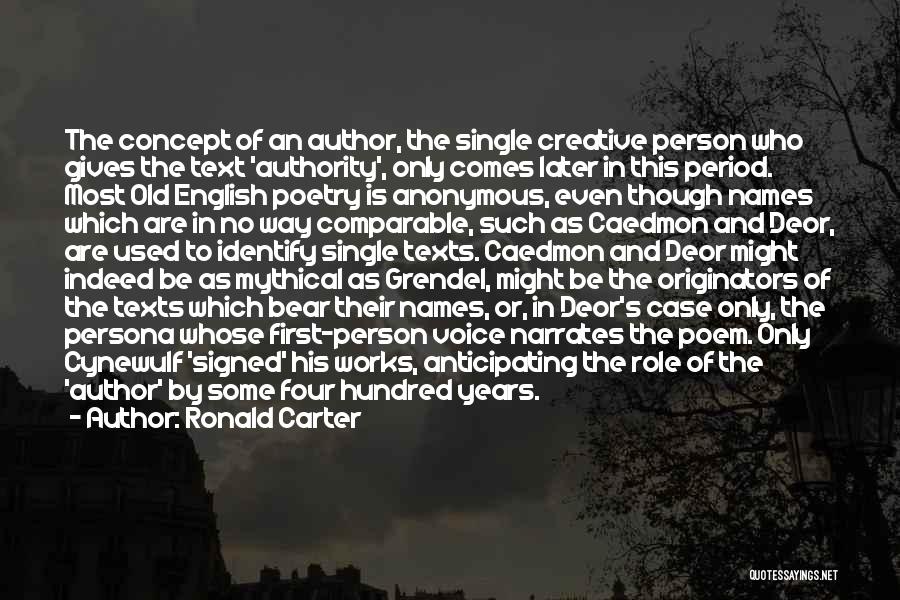
The concept of an author, the single creative person who gives the text 'authority', only comes later in this period. Most Old English poetry is anonymous, even though names which are in no way comparable, such as Caedmon and Deor, are used to identify single texts. Caedmon and Deor might indeed be as mythical as Grendel, might be the originators of the texts which bear their names, or, in Deor's case only, the persona whose first-person voice narrates the poem. Only Cynewulf 'signed' his works, anticipating the role of the 'author' by some four hundred years. — Ronald Carter
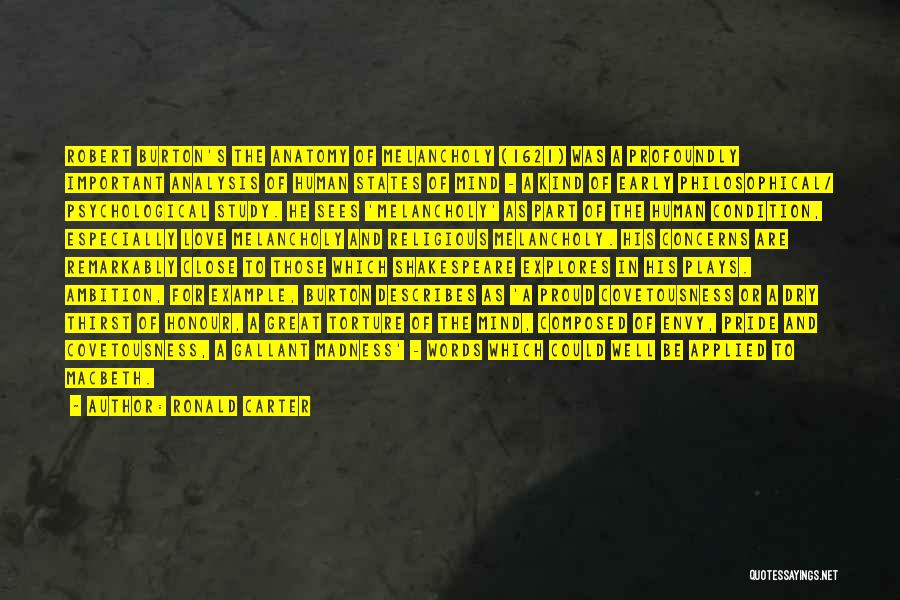
Robert Burton's The Anatomy of Melancholy (1621) was a profoundly important analysis of human states of mind - a kind of early philosophical/ psychological study. He sees 'melancholy' as part of the human condition, especially love melancholy and religious melancholy. His concerns are remarkably close to those which Shakespeare explores in his plays. Ambition, for example, Burton describes as 'a proud covetousness or a dry thirst of Honour, a great torture of the mind, composed of envy, pride and covetousness, a gallant madness' - words which could well be applied to Macbeth. — Ronald Carter
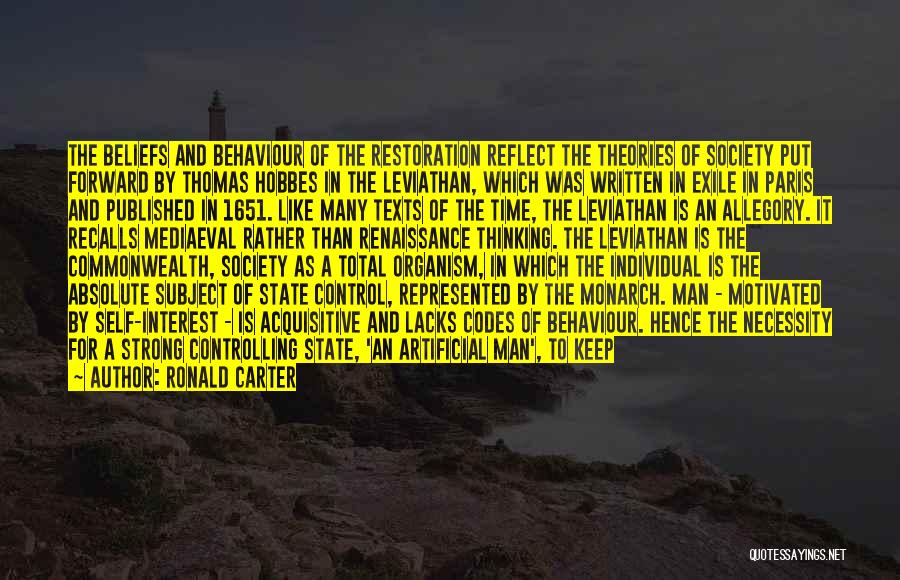
The beliefs and behaviour of the Restoration reflect the theories of society put forward by Thomas Hobbes in The Leviathan, which was written in exile in Paris and published in 1651. Like many texts of the time, The Leviathan is an allegory. It recalls mediaeval rather than Renaissance thinking. The leviathan is the Commonwealth, society as a total organism, in which the individual is the absolute subject of state control, represented by the monarch. Man - motivated by self-interest - is acquisitive and lacks codes of behaviour. Hence the necessity for a strong controlling state, 'an artificial man', to keep discord at bay. Self-interest and stability become the keynotes of British society after 1660, the voice of the new middle-class bourgeoisie making itself heard more and more in the expression of values, ideals, and ethics. — Ronald Carter
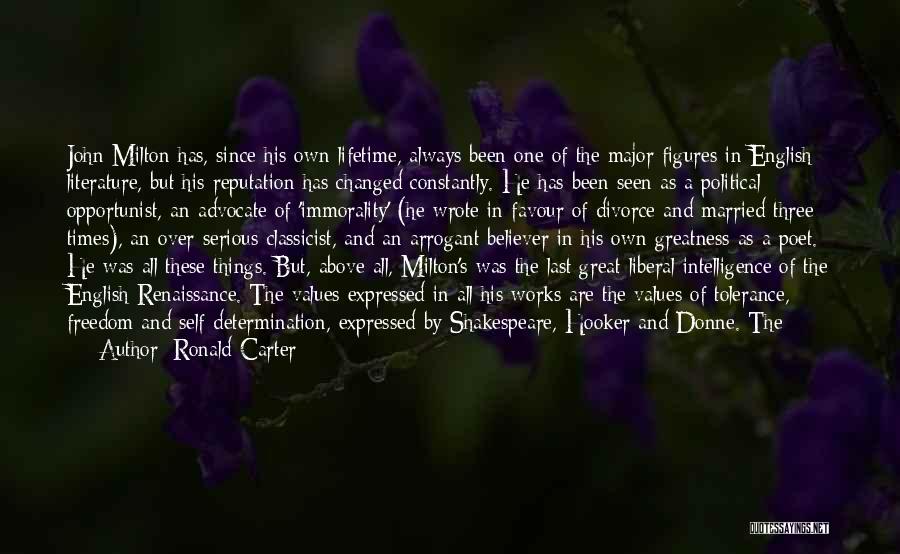
John Milton has, since his own lifetime, always been one of the major figures in English literature, but his reputation has changed constantly. He has been seen as a political opportunist, an advocate of 'immorality' (he wrote in favour of divorce and married three times), an over-serious classicist, and an arrogant believer in his own greatness as a poet. He was all these things. But, above all, Milton's was the last great liberal intelligence of the English Renaissance. The values expressed in all his works are the values of tolerance, freedom and self-determination, expressed by Shakespeare, Hooker and Donne. The basis of his aesthetic studies was classical, but the modernity of his intellectual interests can be seen in the fact that he went to Italy (in the late 1630s) where he met the astronomer Galileo, who had been condemned as a heretic by the Catholic church for saying the earth moved around the sun. — Ronald Carter
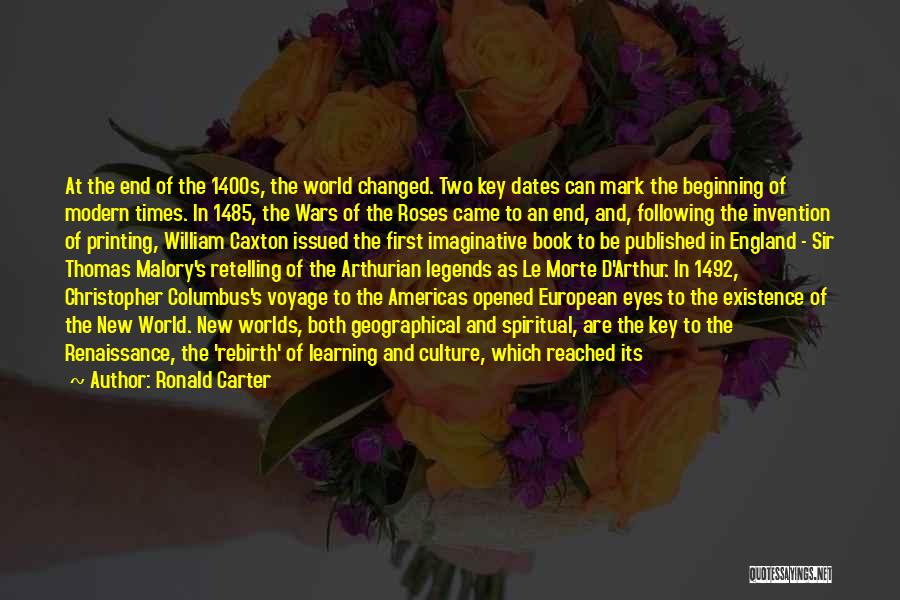
At the end of the 1400s, the world changed. Two key dates can mark the beginning of modern times. In 1485, the Wars of the Roses came to an end, and, following the invention of printing, William Caxton issued the first imaginative book to be published in England - Sir Thomas Malory's retelling of the Arthurian legends as Le Morte D'Arthur. In 1492, Christopher Columbus's voyage to the Americas opened European eyes to the existence of the New World. New worlds, both geographical and spiritual, are the key to the Renaissance, the 'rebirth' of learning and culture, which reached its peak in Italy in the early sixteenth century and in Britain during the reign of Queen Elizabeth I, from 1558 to 1603. — Ronald Carter
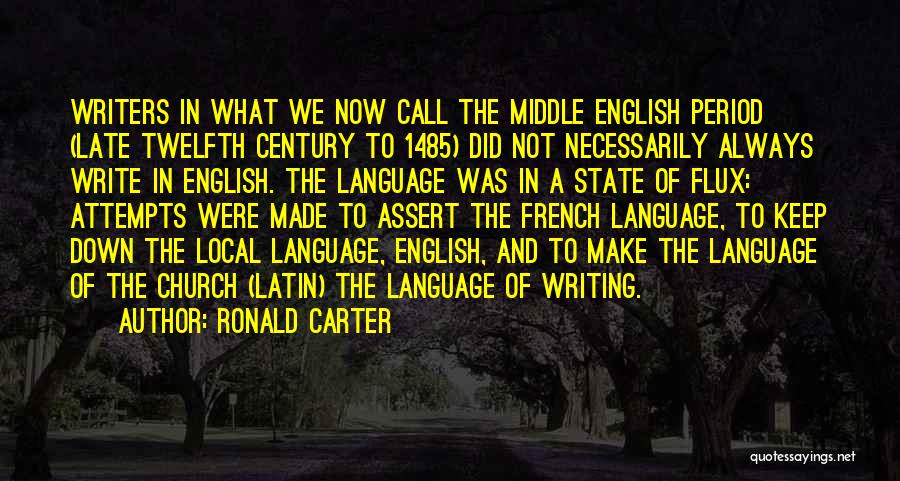
Writers in what we now call the Middle English period (late twelfth century to 1485) did not necessarily always write in English. The language was in a state of flux: attempts were made to assert the French language, to keep down the local language, English, and to make the language of the church (Latin) the language of writing. — Ronald Carter
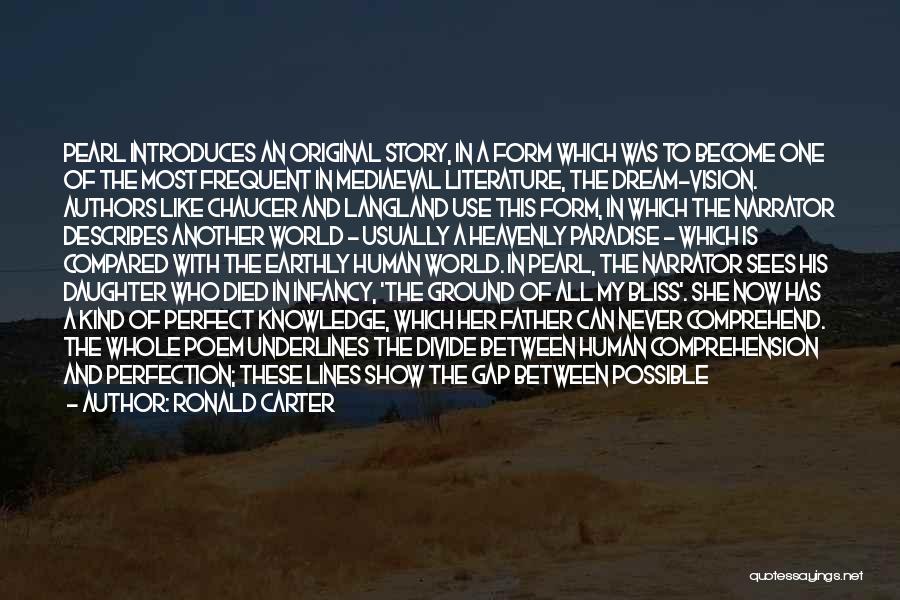
Pearl introduces an original story, in a form which was to become one of the most frequent in mediaeval literature, the dream-vision. Authors like Chaucer and Langland use this form, in which the narrator describes another world - usually a heavenly paradise - which is compared with the earthly human world. In Pearl, the narrator sees his daughter who died in infancy, 'the ground of all my bliss'. She now has a kind of perfect knowledge, which her father can never comprehend. The whole poem underlines the divide between human comprehension and perfection; these lines show the gap between possible perfection and fallen humanity which, thematically, anticipate many literary examinations of man's fall, the most well known being Milton's late Renaissance epic, Paradise Lost. — Ronald Carter
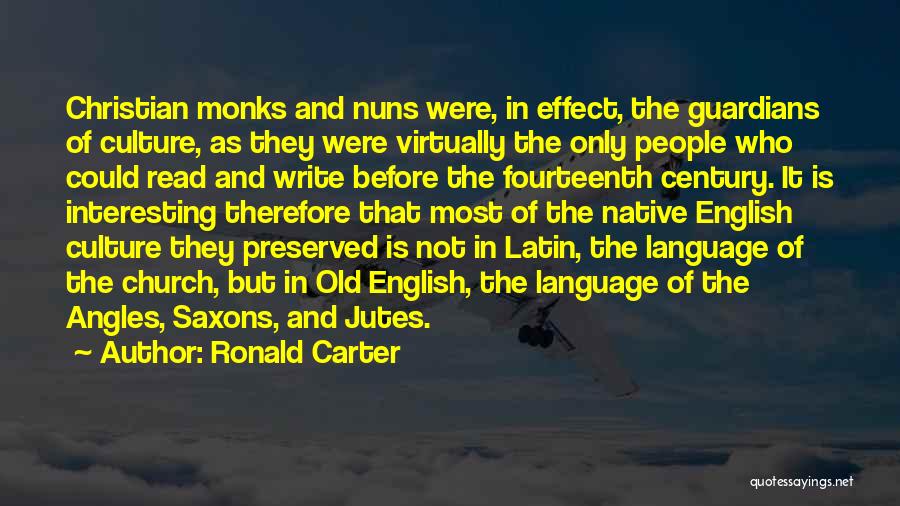
Christian monks and nuns were, in effect, the guardians of culture, as they were virtually the only people who could read and write before the fourteenth century. It is interesting therefore that most of the native English culture they preserved is not in Latin, the language of the church, but in Old English, the language of the Angles, Saxons, and Jutes. — Ronald Carter
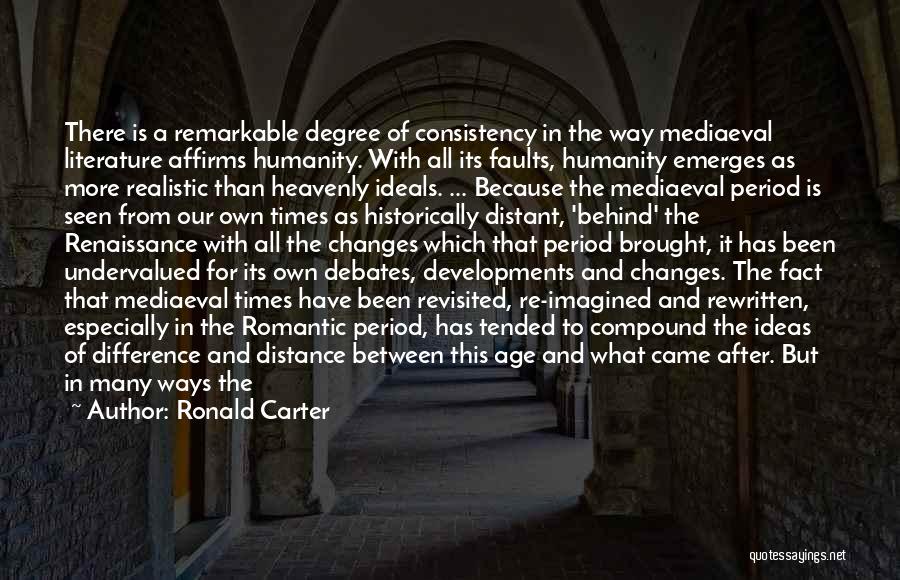
There is a remarkable degree of consistency in the way mediaeval literature affirms humanity. With all its faults, humanity emerges as more realistic than heavenly ideals.
...
Because the mediaeval period is seen from our own times as historically distant, 'behind' the Renaissance with all the changes which that period brought, it has been undervalued for its own debates, developments and changes. The fact that mediaeval times have been revisited, re-imagined and rewritten, especially in the Romantic period, has tended to compound the ideas of difference and distance between this age and what came after. But in many ways the mediaeval period presages the issues and concerns of the Renaissance period and prepares the way for what was to come. — Ronald Carter
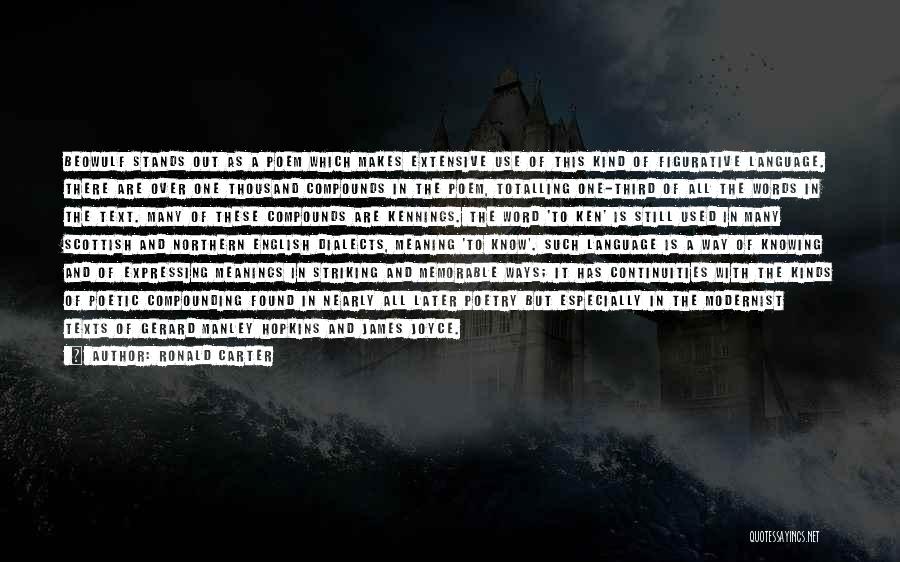
Beowulf stands out as a poem which makes extensive use of this kind of figurative language. There are over one thousand compounds in the poem, totalling one-third of all the words in the text. Many of these compounds are kennings. The word 'to ken' is still used in many Scottish and Northern English dialects, meaning 'to know'. Such language is a way of knowing and of expressing meanings in striking and memorable ways; it has continuities with the kinds of poetic compounding found in nearly all later poetry but especially in the Modernist texts of Gerard Manley Hopkins and James Joyce. — Ronald Carter
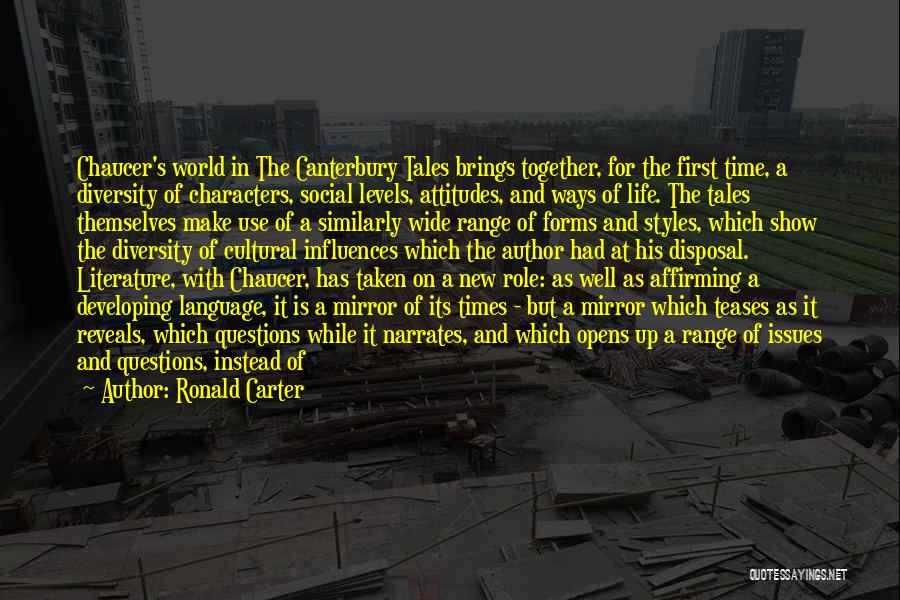
Chaucer's world in The Canterbury Tales brings together, for the first time, a diversity of characters, social levels, attitudes, and ways of life. The tales themselves make use of a similarly wide range of forms and styles, which show the diversity of cultural influences which the author had at his disposal. Literature, with Chaucer, has taken on a new role: as well as affirming a developing language, it is a mirror of its times - but a mirror which teases as it reveals, which questions while it narrates, and which opens up a range of issues and questions, instead of providing simple, easy answers. — Ronald Carter
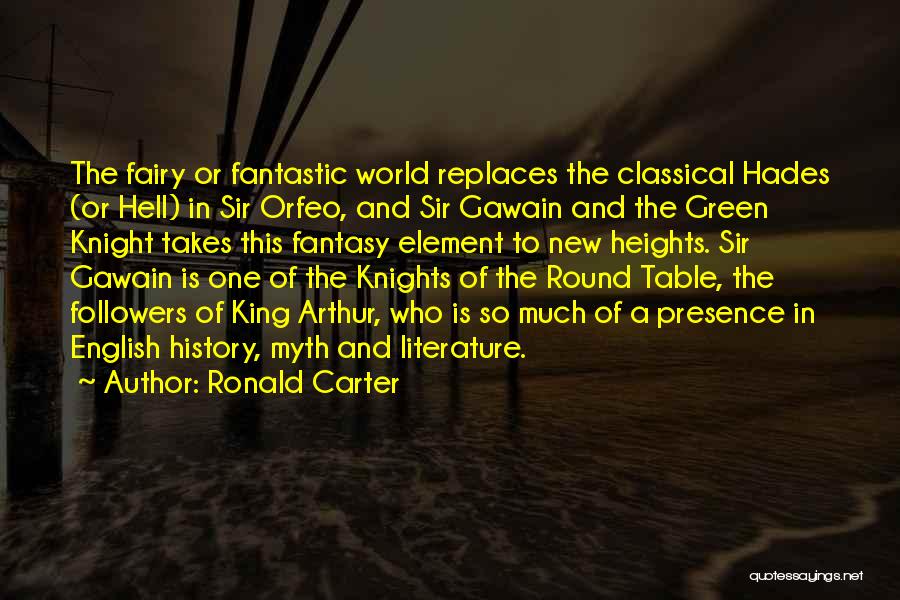
The fairy or fantastic world replaces the classical Hades (or Hell) in Sir Orfeo, and Sir Gawain and the Green Knight takes this fantasy element to new heights. Sir Gawain is one of the Knights of the Round Table, the followers of King Arthur, who is so much of a presence in English history, myth and literature. — Ronald Carter
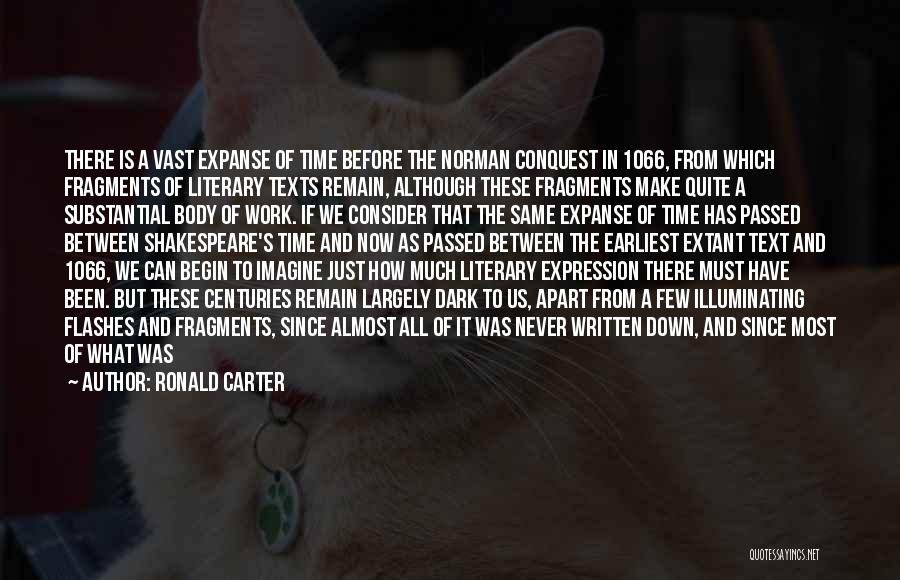
There is a vast expanse of time before the Norman Conquest in 1066, from which fragments of literary texts remain, although these fragments make quite a substantial body of work. If we consider that the same expanse of time has passed between Shakespeare's time and now as passed between the earliest extant text and 1066, we can begin to imagine just how much literary expression there must have been. But these centuries remain largely dark to us, apart from a few illuminating flashes and fragments, since almost all of it was never written down, and since most of what was preserved in writing was destroyed later, particularly during the 1530s. — Ronald Carter
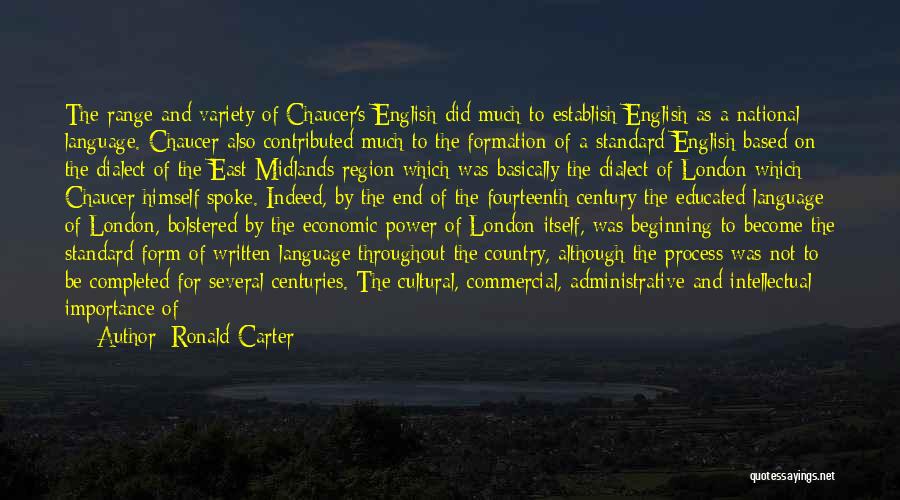
The range and variety of Chaucer's English did much to establish English as a national language. Chaucer also contributed much to the formation of a standard English based on the dialect of the East Midlands region which was basically the dialect of London which Chaucer himself spoke. Indeed, by the end of the fourteenth century the educated language of London, bolstered by the economic power of London itself, was beginning to become the standard form of written language throughout the country, although the process was not to be completed for several centuries. The cultural, commercial, administrative and intellectual importance of the East Midlands (one of the two main universities, Cambridge, was also in this region), the agricultural richness of the region and the presence of major cities, Norwich and London, contributed much to the increasing standardisation of the dialect. — Ronald Carter
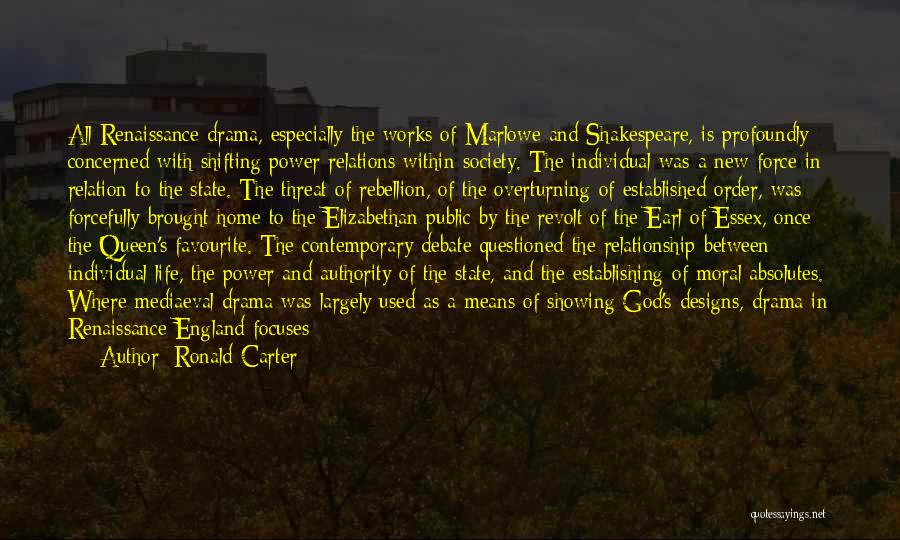
All Renaissance drama, especially the works of Marlowe and Shakespeare, is profoundly concerned with shifting power relations within society. The individual was a new force in relation to the state. The threat of rebellion, of the overturning of established order, was forcefully brought home to the Elizabethan public by the revolt of the Earl of Essex, once the Queen's favourite. The contemporary debate questioned the relationship between individual life, the power and authority of the state, and the establishing of moral absolutes. Where mediaeval drama was largely used as a means of showing God's designs, drama in Renaissance England focuses on man, and becomes a way of exploring his weaknesses, depravities, flaws - and qualities. — Ronald Carter
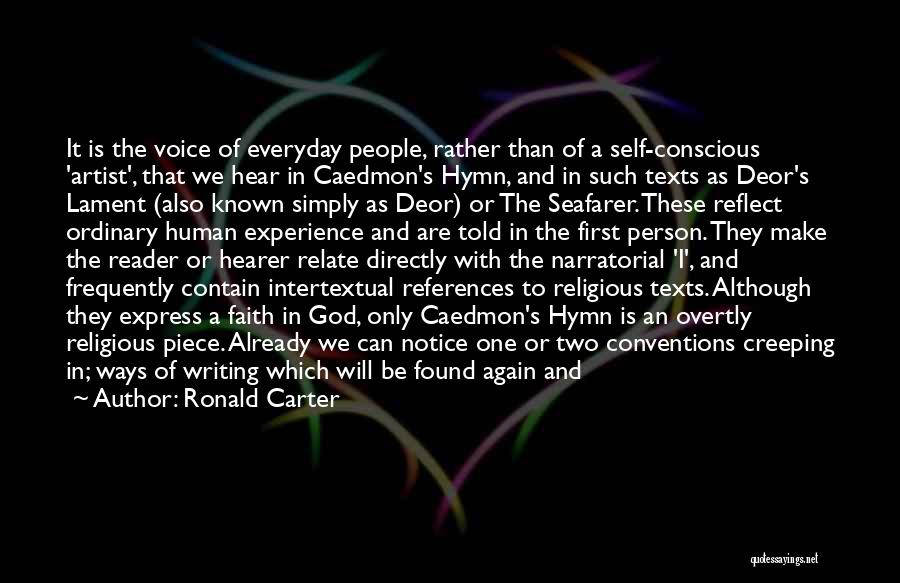
It is the voice of everyday people, rather than of a self-conscious 'artist', that we hear in Caedmon's Hymn, and in such texts as Deor's Lament (also known simply as Deor) or The Seafarer. These reflect ordinary human experience and are told in the first person. They make the reader or hearer relate directly with the narratorial 'I', and frequently contain intertextual references to religious texts. Although they express a faith in God, only Caedmon's Hymn is an overtly religious piece. Already we can notice one or two conventions creeping in; ways of writing which will be found again and again in later works. One of these is the use of the first-person speaker who narrates his experience, inviting the reader or listener to identify with him and sympathise with his feelings. — Ronald Carter
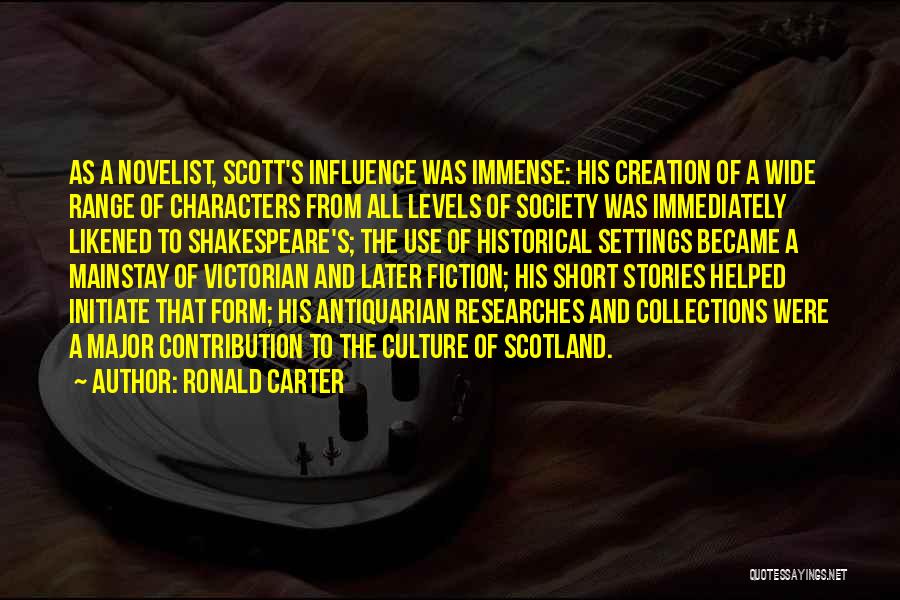
As a novelist, Scott's influence was immense: his creation of a wide range of characters from all levels of society was immediately likened to Shakespeare's; the use of historical settings became a mainstay of Victorian and later fiction; his short stories helped initiate that form; his antiquarian researches and collections were a major contribution to the culture of Scotland. — Ronald Carter
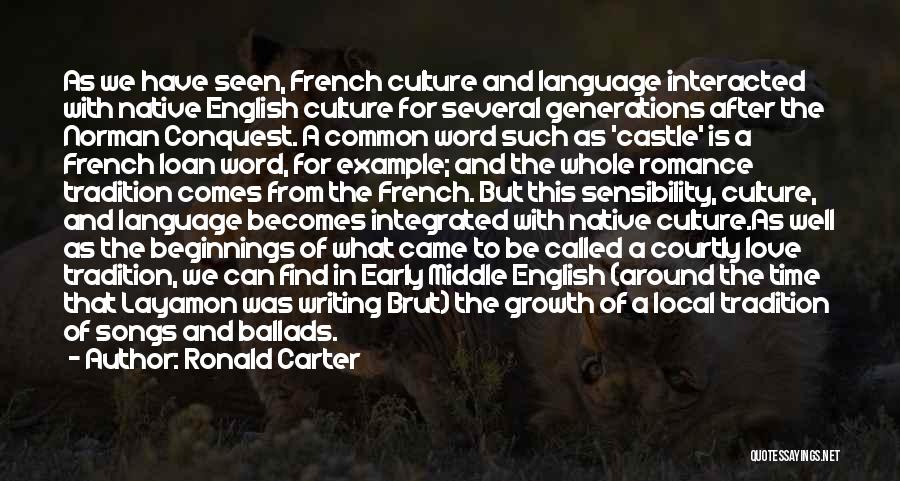
As we have seen, French culture and language interacted with native English culture for several generations after the Norman Conquest. A common word such as 'castle' is a French loan word, for example; and the whole romance tradition comes from the French. But this sensibility, culture, and language becomes integrated with native culture.
As well as the beginnings of what came to be called a courtly love tradition, we can find in Early Middle English (around the time that Layamon was writing Brut) the growth of a local tradition of songs and ballads. — Ronald Carter
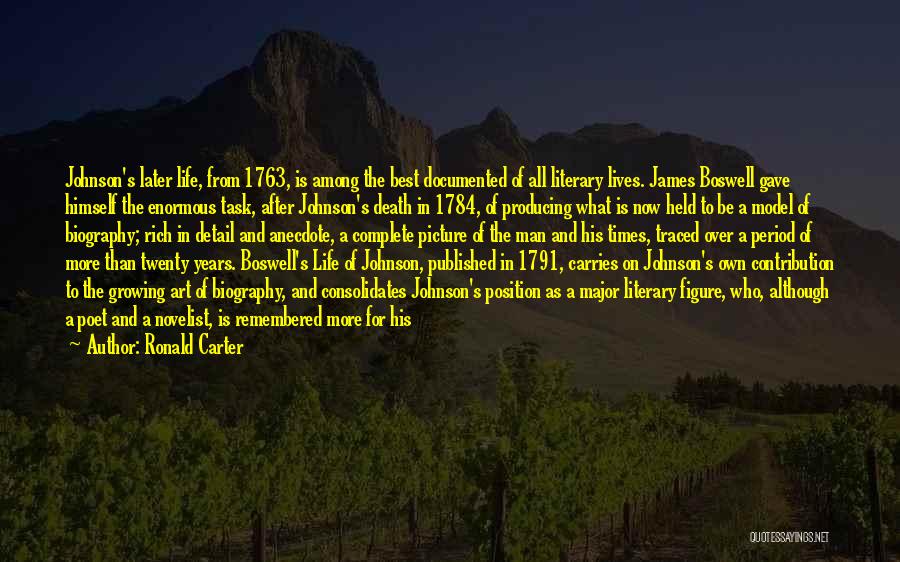
Johnson's later life, from 1763, is among the best documented of all literary lives. James Boswell gave himself the enormous task, after Johnson's death in 1784, of producing what is now held to be a model of biography; rich in detail and anecdote, a complete picture of the man and his times, traced over a period of more than twenty years. Boswell's Life of Johnson, published in 1791, carries on Johnson's own contribution to the growing art of biography, and consolidates Johnson's position as a major literary figure, who, although a poet and a novelist, is remembered more for his academic and critical achievement than for his creative writings. — Ronald Carter





